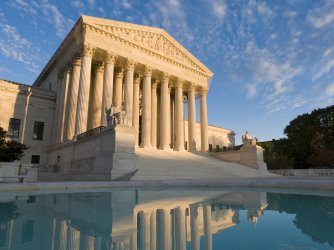Table of Contents
Movement for academic boycott of Israel continues to raise thorny problems, produce bad consequences

The University of Michigan has determined that it will punish John Cheney-Lippold, a professor in the university’s Department of American Culture, for declining to write a recommendation letter for a student who wished to study in Israel. As he explained to the student, he refused to write the recommendation not because of the student’s academic merit, but rather because he desired to adhere to the Boycott, Divestment, and Sanctions movement that, among other goals, asks universities and individual academics to refrain from engaging in most ways with institutions of higher education based in Israel, including study abroad programs.
Cheney-Lippold’s refusal to write a letter of recommendation came after he had initially agreed to write the letter, and was rescinded only after he realized the student’s intended destination. Yesterday, the Washington Post revealed that yet another Michigan student who wished to study in Israel had an offer to write a recommendation letter withdrawn, for substantially identical reasons, by a graduate student instructor.
As always, FIRE takes no position on the main issues that underlie the Israeli-Palestinian conflict. However, FIRE has long been concerned about the effects that the effort to academically boycott institutions in Israel cannot help but have on academic freedom for students and faculty members right here in the United States. (The divestment and sanctions aspects of the BDS movement are outside FIRE’s mission.) As FIRE President and CEO Greg Lukianoff wrote in 2015,
[T]he “boycott” part of BDS, which would require American academics not to cooperate with Israeli scholars or institutions, is incompatible with academic freedom. Academic freedom is a vast and majestic idea that relies on open communication across lines of difference in a global system of checking, arguing, researching, collaborating, and competing to produce better ideas. It’s a critical part of the way we come by new knowledge, creative solutions, and novel perspectives. The idea that a college might ban its scholars from working with scholars of a particular nationality or who work in a particular country in the name of opposing that country’s government is incompatible with this open, liberal system.
The same goes for the American Association of University Professors, which has opposed the academic boycott effort aimed at Israel as well as “all academic boycotts in principle.”
However, we may have to confess to a failure of imagination when it came to the ways in which this negative effect on academic freedom in the United States can manifest itself — particularly the extent to which it can have particularized and serious repercussions for individual students.
While the immediate negative effect on students denied recommendations is easy to see, this type of application of the boycott movement risks doing serious, though less obvious, damage to faculty freedom of speech, including the right not to speak. Faculty recommendation letters are, of course, a type of speech. (They are, after all, letters.) Whether or not to write them on behalf of a particular student is also traditionally, and necessarily, left to the discretion of the individual faculty member, as it would be entirely nonsensical to require faculty members to write recommendation letters for students they simply can’t or don’t recommend. Yes, writing such letters is an expected part of the job, but generally speaking, no student has a “right” to a recommendation letter.
That said, there are certainly impermissible reasons that faculty could refuse to write a recommendation. Most obviously, a faculty member who refused to write letters for black students, or members of a given sex, based solely on his or her antipathy to members of that group, would be engaging in clearly prohibited discrimination against those for whom he or she refused to write letters. Getting closer to this example, if faculty members were refusing to write recommendation letters on the basis that the students requesting them were Israeli, that would be prohibited discrimination based on national origin.
But that’s not exactly what is happening here. The refusal to write the letters appears to be based not on the national origin of the students, but their national destination. That is not a distinction without a difference. National destination (or whatever one might call it) is not a protected class, and the adverse effect on the students is caused not by hostility towards the students themselves but on hostility to a third party (in this case, academic institutions in Israel) that renders the affected students’ wishes to study abroad a kind of “collateral damage” of the wider boycott movement.
The University of Michigan has come down firmly on the side of those who say the professor should have written the letter. In an Oct. 3 letter to Cheney-Lippold, interim dean Elizabeth R. Cole writes:
There is an expectation that our faculty will provide letters of recommendation to students who need them for many reasons, including admission to programs of study and job applications…. A student’s academic merit should be the primary guide for determining whether to write a letter. Faculty are not required to write letters for every student who requests them, and have discretion to decline for legitimate reasons such as lack of time, information about the student, and academic assessment; however, that discretion is not unfettered. It does not extend to withholding a letter because of your personal views regarding the student’s place of study and then using the student’s request as a political platform to gain an audience for your own opinions, both in the media and in the classroom.
(The last accusation above may be unfair to Cheney-Lippold, as it appears that his decision only became public when someone opposed to it posted a screenshot of his email to social media.)
Cheney-Lippold’s punishment is substantial; he was declared ineligible for a merit raise for this school year and also had his sabbatical eligibility and credits frozen for two years, pushing a planned winter 2019 sabbatical to fall 2020. The dean’s letter suggested that Cheney-Lippold should have known better, and that the canons of professional responsibility and ethics statements clearly prohibited his action. However, this is a subject of live debate, and it still leaves open questions of what motives might be acceptable for refusing to recommend a student to a certain country. To take just one example, must a professor write a recommendation letter for a student who wishes to study abroad in a place where the professor genuinely believes the student is likely to face danger or imprisonment?
And yet, if we do come up with a definitive answer to this question one way or another, we may simply have to move on to another set of problems. What other reasons might be illegitimate ones for professors to refuse recommendations, and do those teaching now have any reasons to know what those might be? Will professors now be afraid to refuse to write recommendations at all, rendering them basically meaningless? Will professors actually be willing to write recommendations to study abroad in Israel or other countries that might be subject to a boycott, or will they simply find other reasons not to write such letters? And if professors are allowed to make political determinations about what recommendation letters to write, is it reasonable for faculty to expect lawmakers or parents to sit by idly while they deny otherwise deserving constituents, or children, recommendations based on their own politics?
These are hard questions, not easily settled. And the way they are settled may poorly serve academia, students, and/or faculty. But this particular set of problems is the inevitable result of the injection of politics into the world of study-abroad recommendations, brought about in turn by the effort to academically boycott Israel. There’s a reason that principles like academic freedom (and freedom of speech, due process, and so forth) are supposed to be above politics. Once those principles start to be chipped away for the political advantage of one side or the other, it shouldn’t surprise anyone that all the remaining choices may turn out to be bad.
Recent Articles
FIRE’s award-winning Newsdesk covers the free speech news you need to stay informed.

Don’t turn commencement season into cancellation season

MIT stops using DEI statements in faculty hiring

The 8 First Amendment cases the Supreme Court will decide this term
